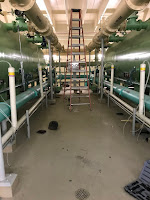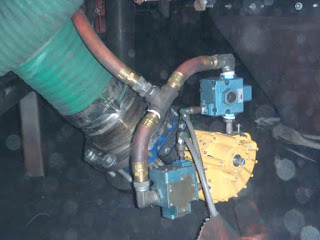The Kinetrol rotary vane design is based upon a single moving part which eliminates additional parts required to convert linear motion to rotary motion. This simple and innovative design provides a highly accurate and extremely reliable actuator for operating valves, drives and dampers, and is perfectly suited for the most demanding process control applications. For more information visit www.kinetrolusa.com or call 972-447-9443.
Valve Failure Modes
 |
| Failsafe spring lever on ball valve. (Kinetrol) |
Available Failure Modes
Valve fail mode may be shown in instrument diagrams by either an arrow pointing in the direction of failure (assuming a direct-acting valve body where stem motion toward the body closes and stem motion away from the body opens the valve trim) and/or the abbreviations “FC” (fail closed) and “FO” (fail open). Other failure modes are possible, as indicated by this set of valve symbols:
In order for a pneumatic or hydraulic valve to fail in the locked state, an external device must trap fluid pressure in the actuator’s diaphragm or piston chamber in the event of supply pressure loss.
Valves that fail in place and drift in a particular direction are usually actuated by double-acting pneumatic piston actuators. These actuators do not use a spring to provide a definite fail mode, but rather use air pressure both to open and to close the valve. In the event of an air pressure loss, the actuator will neither be able to open nor close the valve, and so it will tend to remain in position. If the valve is of the globe design with unbalanced trim, forces exerted on the valve plug will move it in one direction (causing drift).
Reprinted from "Lessons In Industrial Instrumentation" by Tony R. Kuphaldt – under the terms and conditions of the Creative Commons Attribution 4.0 International Public License.
Upper Midwest Water Treatment Plant says "Out with the old, in with the new!"
 |
| Before project. |
 |
| Project begins. |
An Upper Midwest water treatment plant was experiencing high failure rates, long maintenance periods, and too many repair issues with their existing pneumatic scotch-yoke cylinder valve operators.
Upon investigation, the problem boiled down to how the scotch-yoke cylinder's linear movement is converted to rotational movement. To do so requires gearing, yokes and linkage which are wear points. In medium to high cycle rate applications these wear points soon become failure points.
Kinetrol rotary vane actuators utilize a single moving part - the one-piece vane and shaft. There are no gears, yokes, or linkages and 100% of the movement is transferred to the actuator shaft. The one piece vane and shaft eliminates these wear points, and therefore eliminates the resulting failure points.
 |
| Out with the old. |
 |
| In with the new. |
After a planning review meeting, this particular water treatment plant clearly saw the advantages of the Kinetrol design. The argument was so strong and the case so clear, they decided to replace all (60) scotch-yoke cylinder actuated valves with Kinetrol vane actuators in one fell swoop.
The new actuators have been operating for 6 months now without problem, cycling approximately 15 times per day.
Click on the images above to see a larger view. For more information, contact Kinetrol USA by visiting https://kinetrolusa.com or by calling 972-447-9443
The Kinetrol Actuator Vane Assembly Design
The Kinetrol rotary vane actuator utilizes an advanced design vane assembly that is engineered to provide millions of trouble-free cycles. This video highlights the advanced features that make it the most reliable 1/4 turn pneumatic actuator on the market today.
https://kinetrolusa.com
972-447-9443
972-447-9443
Kinetrol Actuators Stand Up to Tough Iron Foundry Environment and Very High Cycle Rate
 |
| Kinetrol on high cycle valve. |
The rack and pinion actuator was replaced with a Kinetrol vane actuator and the customer's problem disappeared. The Kinetrol actuators have performed for over 2 years now without problem.
Click on any of the pictures for a larger view.
Kinetrol Actuator "Insures" Rapid Valve Closing to Protect Equipment, Infrastructure, and Personnel
 |
| 20" high performance butterfly valve with Kinetrol actuator |
Requirement:
It's necessary to prevent a $30M USD axial process air compressor from rapidly going into an overspeed condition that could harm equipment, infrastructure, and personnel.
Challenge:
 The biggest challenges: stroking the valve in under one second, but without slamming the butterfly disc into the stops which can damage the valve and nearby equipment.
The biggest challenges: stroking the valve in under one second, but without slamming the butterfly disc into the stops which can damage the valve and nearby equipment.
Solution:
Kinetrol's expertise in rapid cycling enabled us to size, select, and perform certified cycle time tests on the final assembly. This shut out any competition.
Assembly:
20" class 300 high performance butterfly valve, Kinetrol 207-120 with a 2" automatic L-Port, 3-way, compressed air supply ball valve with 097-F120, X-proof solenoid, and two exhaust silencers coupled to the size 20 supply port. Open / closed limit switch assembly. Robust SST mounting bracket and coupling. The closure time once actuator air is exhausted: 0.13 seconds.
Kinetrol Blueline Actuator for Use in Foodservice and Beverage Processing
Kinetrol's "Blueline" Series of pneumatic vane actuators for use in foodservice and beverage processing. The actuators are intended to be installed in areas where harsh chemical wash-down is required. These areas are very tough on most types of pneumatic actuators because the caustic or acidic chemicals used in cleaning adversely effect the actuator. Kinetrol's Blueline Series provides a very economical option these areas.
Subscribe to:
Posts (Atom)




